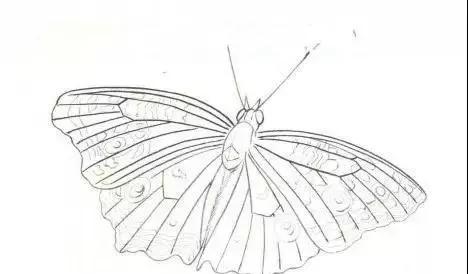Several ways to draw butterflies with a pen
Butterflies are often represented in the brush strokes, and various flowers can be used as a matching scene in spring, summer and autumn. In the warm spring, hot summer, to cool autumn season range, there will be butterfly activities, according to the size of the frame, with the right size of the butterfly. Large flowers such as peony flowers are suitable for painting large butterflies, while small flowers and grasses in the wild are more suitable with pink butterflies and gray butterflies. Butterflies can also be expressed alone, such as "Hundred Butterfly Figures" is one of the favorite subjects of successive generations of flower and bird painters. Here are a few ways to draw butterflies with a brush.
First, the snake-eyed butterfly dyeing step
Step 1: Draw the line in medium ink and pay attention to the change of the thickness of the line.

Step 2: Light ink to dye the butterfly parts, the ink color should not be too black, to dye the structural changes. After drying, the black markings are stained with heavy ink, and the ink color of the forewings to the hindwings is gradually reduced.
Step 3: Use charred tea to mix the ochre to dye the head, back and abdomen, and then blend outward from the wing roots. The brownish yellow-white markings on the wings are flat coated with pale white powder, and the vermilion tuning garcinia is flat coated with snake eye markings.
Step 4: The black markings of the forewings are stained with thick ink, the black markings of the hindwings are stained with heavy ink, and the snake's eye markings are stained with thick ink.
Step 5: Use the fine brush method to point out light brown scales with the charred tea ochre, and other markings should also be pointed out by this method. Strengthens the structure of the head, silking out the villi on the inner edge of the hindwings of the dorsal hindwings. Use white powder to tone less purple to point out the snake's eye spots.
Second, silk powder butterfly dyeing steps
Step 1: Light ink line, comfortable line and strength.
Step 2: Apply light white powder to the wings and complete it several times. After drying, dye the head, eyes, and abdomen with light ink to render a dark base color to highlight the white pink butterfly.
Step 3: Use light charred tea to blend outward from the root of the wing, and the head, chest and abdomen are also stained with light charred tea. The wings are blended with pale white powder to blend ochre from the outer edges of the wings to the inside. The eyes, legs, and antennae are stained with flower blue ink.
Step 4: Use ochre ink fine brushwork to point out the black scales on the edge of the forewings. Use the same brushwork to point out the ink scales on the lower part of the hindwing. The back and chest are also lined with light ink. The lower edges of the thorax , abdomen , and hindwings are stained with light ochre.
Step 5: The upper part of the forewing is dyed with pale white powder, the eyes, antennae, legs and feet are dyed with chrysobealis ink, and finally the mid-ink relapse wing veins.
Third, the small gray butterfly dyeing steps
Step 1: Use medium and light ink to outline the changes in perspective.
Step 2: Use light ink to dye the wings, head, chest and abdomen, and the white parts of the wings are vacated.
Step 3: Charred tea blending ochre plus goose yellow faintly smudged wings, light roots, deep edges, empty markings. The chest and abdomen are also stained with this color.
Step 4: Butterfly wings are flat coated with charred tea, leaving waterlines, dark brown markings are flat coated with burnt tea ink, black markings are flat coated with heavy ink, and eyes are blended with thick ink. The white spots in the outer ring of the stripes are coated with white powder plus three green and rouge, and the lower wings are blended with white powder, three greens and rouge from the root of the wings.
Step 5: Burnt tea, ochre white powder point out the outer edge of the scales of the wings, use white powder to adjust the lake blue plus ochre from the root of the wing faintly blended, chest, abdomen and wing edges with white vermicelli.
Thanks for the good attention!